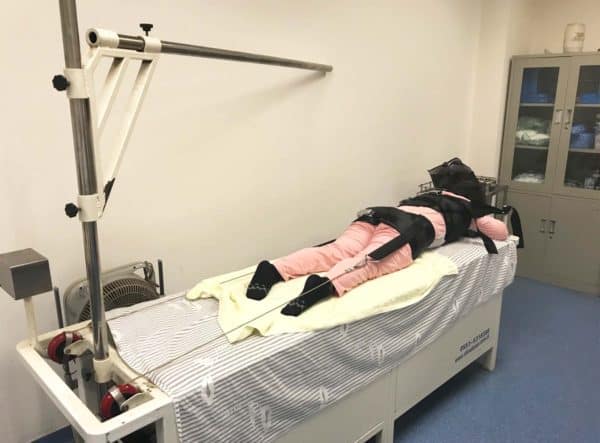Back Pain and Sciatica
OBJECTIVE:
To compare the effect of proximal needling and routine acupuncture for sciatica.
METHODS:
Researchers randomly split sixty sciatica patients into two groups: proximal needling and routine acupuncture, with thirty patients each. The proximal needling group received treatment at Huantiao (GB 30). Meanwhile, the routine acupuncture group underwent acupuncture at Huantiao (GB 30), Yinmen (BL 37), Weizhong (BL 40), Yanglingquan (GB 34), and other points using standard methods. Initially, before treatment, the Numerical Pain Rating Scales (NPRS) and Japanese Orthopaedic Association Scores (JOA) were carefully assessed. Subsequently, after treatment and during follow-up, both NPRS and JOA scores were consistently evaluated for changes.

A patient receiving traction for sciatica
RESULTS:
The total effective rates were 100.0% (30/30) in both groups, with no significant difference between the two groups (P > 0.05) in 3 months follow up.
After five treatments, the proximal needling group achieved a 100.0% (30/30) improvement rate, surpassing the routine acupuncture group’s 80.0% (24/30). Consequently, NPRS and JOA scores significantly improved in both groups after five treatments and during follow-up compared to pre-treatment (all P<0.05).
CONCLUSION:
The proximal needling treatment has a rapid and obvious therapeutic effect and analgesia on back pain and sciatica.
Resources:
– SOURCE: Chad Dupuis, Chattanooga Acupuncture and Wellness Center located in Tennessee
http://www.ncbi.nlm.nih.gov/pubmed/21692291
Initially, Dr. Tony trained in Shanghai and Anhui hospitals, learning from acupuncture and Chinese medicine masters. Meanwhile, in 1994 Melbourne, Australia, Dr. Tony began studying sports massage, kinesiology, herbal medicine, Reiki, and other natural healing therapies.
This led to his love of Acupuncture and traditional Chinese medicine. Dr. Tony has been studying natural medicine for over 26 years.
